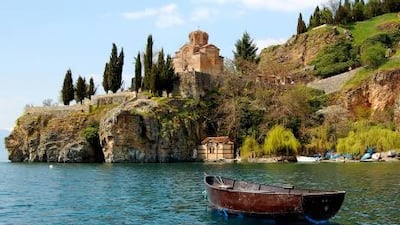Before I left for Macedonia, I asked for recommendations from a friend who had been to most of the region. I told her I was looking for a restful, quiet place that is also fairly well connected with the outside world. "I know just what you need," she said. "You should go to Lake Ohrid, Macedonia."
That sounded good to me. There was just one problem: at the time, I had never heard of Macedonia.
The closest I'd been to this part of Europe was a week-long trip to Budapest and Prague. This time, I wanted to explore a bit further. What could I learn beyond the bigger cities? And where was Macedonia, actually?
It turned out that Macedonia was in Southeast Europe, just above Greece, and getting there required a late-night bus ride with a group of Albanians. Thankfully, this was no 36-hour bus ride like the one I'd taken through Uganda, Kenya and Tanzania; instead, it was a series of trains and buses through the whole region. I began in the former Yugoslavia, travelling by the water through Croatia and Montenegro without a real plan. At each stop I stayed for a while, eventually turning up at another bus or train station, asking about the next ride out of town.
At the midnight border stop, I was initially concerned when the Albanians were quickly waved on but the bus was held up for me, the sole holder of a non-regional passport. Thankfully, I paid only $10 (Dh37) for a visa and we were soon on our way. A few hours after midnight, I was dropped off at the town entrance of Ohrid, the city with the same name as the lake I had been recommended. I had a reservation at a small inn, but not until the next day - and the city was fully booked that night. A huge party was taking place, with techno music blasting through the square, and even a group of young children were playing in the streets as if it were lunchtime recess at kindergarten.
Albanian buses not being conducive to sleep so I had arrived bone-tired. After walking through the town, I left my bags at the inn and asked for the earliest possible time I could check in. Maybe if I came back in the morning, the night attendant hinted, something could be worked out.
I've slept on the floor of airports all over the world. On the theory that if I have a flight at 6am and a late connection the night before, it doesn't make sense to get a room. I'll do my best to "borrow" a blanket or two from the previous flight and camp out in a quiet area. The goal is to, firstly, get at least three to four hours of sleep, and secondly, avoid getting hassled by the cleaning crew (usually friendly) and the police (not always friendly).
The Ohrid arrival was a new challenge, however: there was simply nowhere to sleep, and even the benches were occupied. Desperate, I laid down on the ground by a church and closed my eyes. Real sleep was impossible, but I rested for as long as I could with the techno music in the background. At 5am I went back to the inn. It probably wasn't quite "morning time", but my desperation was visible. The night clerk let me in.
After I had slept, I enjoyed my stay in Ohrid very much. Over the next few days, I wandered the town, ran around the lake and settled in. I talked with Annika, who was attending hospitality school and hoped to work in London or New York one day. When it came time to leave, I took another bus up to Skopje, the modern capital city of Macedonia. I liked it there, too, and began to think of staying longer. Everyone talks about moving to Paris, or perhaps Lisbon or Prague as the slightly more exotic choice. But what would it be like to move somewhere you had no history? Maybe one day I'll settle in Skopje, and people will ask, "Where's that?"
Getting out of Macedonia was complicated. I was heading up to Serbia, but first I wanted to stop in Kosovo, a quasi-independent region with an ethnic Albanian majority and which is administered by the United Nations. Because of a long-standing dispute, Serbia does not recognize Kosovo's independence and makes it as difficult as possible for travellers who want to visit both areas.
Upon leaving Macedonia and entering Kosovo, travellers receive a passport stamp from Unmik, the United Nations Mission in Kosovo. This stamp, however, is not valid for travel in Serbia - so if you try to continue your journey onward from Kosovo, you'll likely be turned away. To go north, I first had to travel three hours back south to Skopje and transfer to the train station for another journey back in the same direction. From there I took the night train, paying €20 (Dh100) upon boarding for a sleeper (no sleeping on the floor of the train for me).
Before bedding down, I met a young couple who had recently worked in the US, he as a travelling dancer in a theatre production, and she as an au pair in Boston. I asked what their favourite aspect of America was, and this led to a discussion of Starbucks (her choice) versus. Dunkin' Donuts (his choice). Fortunately, they had also seen more than just the coffee shops.
I arrived in Belgrade around 10am and settled in for another adventure.
Chris Guillebeau, 33, is on a five-year mission to visit every country in the world. He is currently on number 164. Next week: the writer reveals his "packing list" strategy.????

